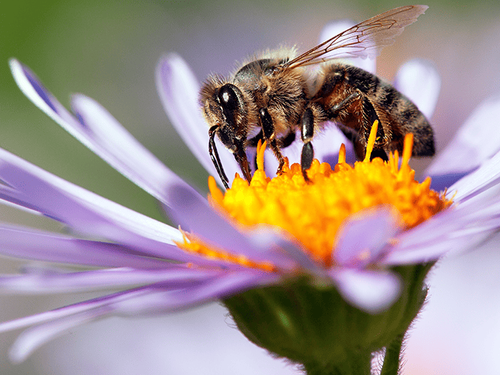What do honey bees look like?

The official state bug of New Jersey since 1974, the honey bee plays an essential role in pollination and is a protected stinging insect in New Jersey. To identify a honey bee, you should look for a bug that is approximately 5/8 to ½ inch in length, has a thin body covered in short pale hairs (as opposed to fuzzy bumblebees). Honey bee coloring ranges from orangish brown to black in color and the bands on their lower portion appear are orange and black or black and brown. Honey bees, like wasps, hornets, and other species of bees, are equipped with stingers. Worker honey bees have barbed stingers, drones don’t have any stingers, and queens have stingers without barbs.
What attracts honey bees?
Foraging honey bees are attracted to nectar, pollen, and water. If you have flowers, fruit trees, and vegetable gardens, you’ll likely find these pollinators on your property.
Garbage receptacles beside the house, open soda cans on the deck, and other sweet foods and drinks outside are also strong attractants for honey bees.
Wearing bright clothes and floral perfumes can also cause a close up encounter with this type of bee.
Are honey bees dangerous?
While honey bees are not aggressive by nature, they will attack if they perceive a threat to the colony. According to the NWNJBA, stings may also occur if a honey bee is stepped on by a bare foot, if the bee is caught in a person’s clothing or hair, and other accidental encounters.
When a worker honey bee stings in defense, it will not live beyond that sting. As we mentioned above, the barbed stingers this member of the bee colony has will remain in the sting victim and without its stinger, the honey bee will die. The barbed stinger that stays behind after a sting will release poison from its venom sac into its victim. Depending on the sensitivity of the individual, this could result in a sharp, burning pain at the sting site accompanied with redness and slight swelling. It can also be incredibly dangerous for those who are allergic to honey bees. Severe allergic reactions to honey bees may include, but are not limited to:
- Hives
- Itching
- Difficulty breathing
- Swelling of the throat and tongue
- Nausea or vomiting
- Diarrhea
- Dizziness or fainting
If you are stung by a honey bee and are experiencing any of the symptoms mentioned above or other health concerns, seek medical treatment immediately.
Where do honey bees nest?
It is important to note that honey bees are social insects with several thousand individuals living together in a single hive. Honey bees do not construct nests in the ground nor are they likely to build their nests in exposed areas. Common places to find honey bee nests include:
- In tree hollows
- Under sheds or other outbuildings
- In rock crevices
- In eaves and soffits
- Behind siding and brick
In some situations, honey bee nests have also been found inside wall voids.
What should I do if I find a honey bee nest on my property?
If you find a honey bee nest on your property and it doesn’t pose an immediate threat to you or anyone else, you should leave it alone. As previously mentioned, honey bees are protected and the work they do pollinating flowers and crops is a major benefit to us all.
Now if you have discovered a honey bee nest on, in, or near your home, action is probably necessary in order to protect you and the honey bees. In a situation like this, we highly recommend contacting an experienced beekeeper who can help you relocate the nest and preserve these protected bees.
If you’ve found a nest but are not sure if it’s honey bees or another type of stinging insect in New Jersey, give Arrow Pest Control a call. We’d be happy to stop by for a free evaluation and let you know if you’re dealing with honey bees or other stinging pests.
Can I prevent honey bees?
While you don’t want to necessarily prevent honey bees from nesting on your property, it is a good idea to take measures so that these bees don’t establish nests on or in your home or close by areas where you, your family, or pets frequent. Here are few tips to implement when you’re spending time outdoors:
- Keep sweet drinks and foods covered
- Clean up crumbs and spills right away
- Do not leave food out for any length of time
- Don’t let trash cans overflow

Testimonials
Request Your FREE Estimate
Additional Services
Our solutions are designed for even your toughest pest problems.
Don’t let pests affect your quality of life, here's how we can help:
